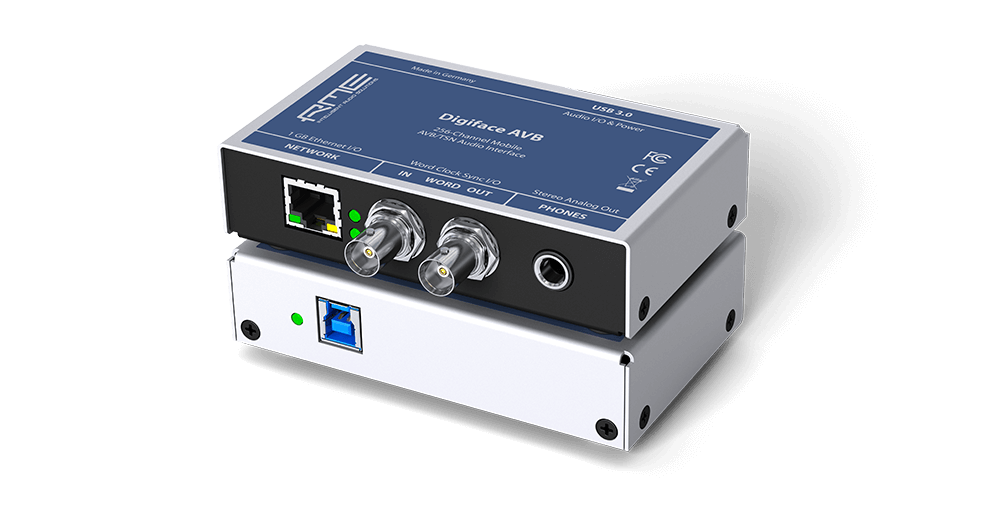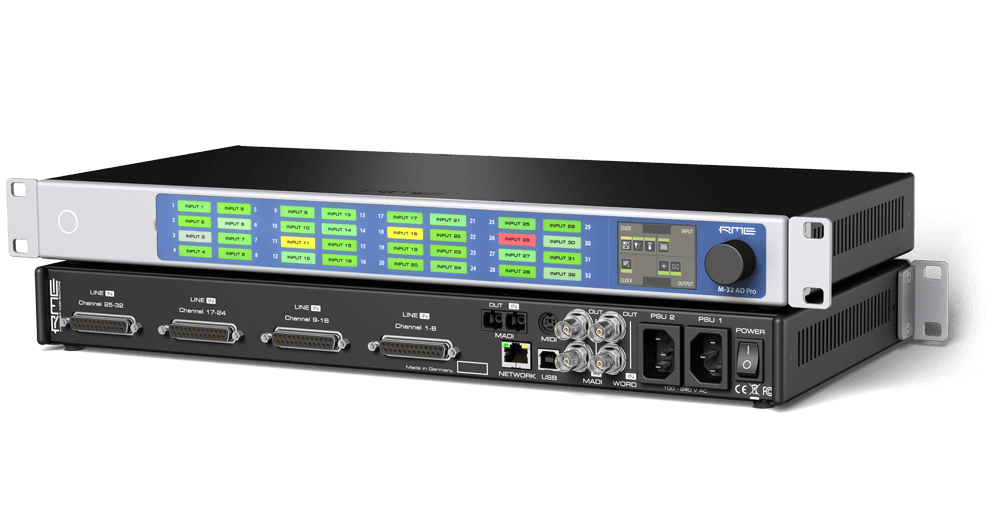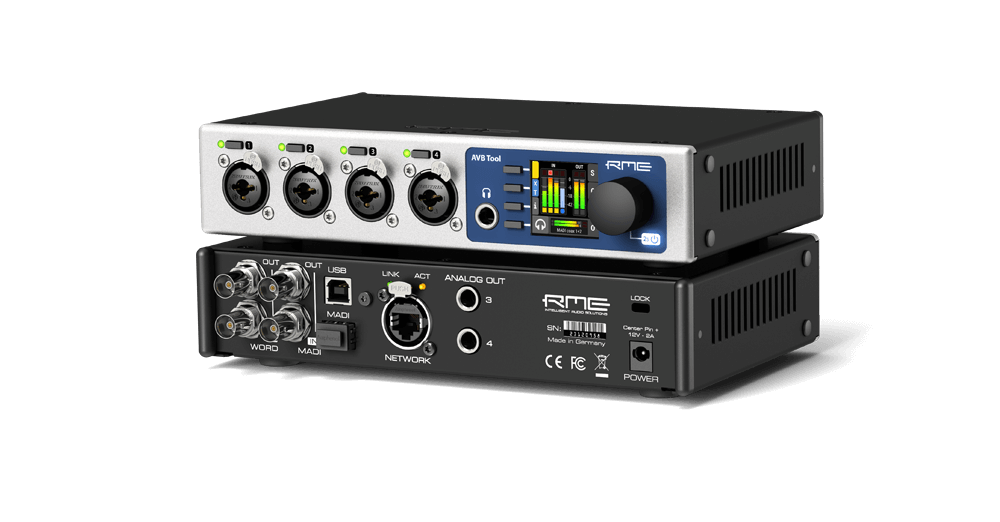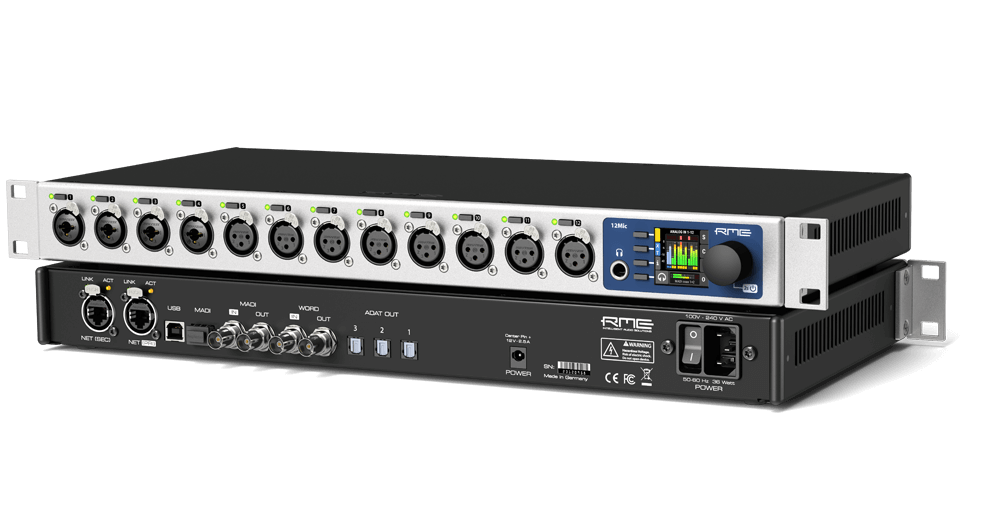M-1610 Pro
16 channel A/D, 10 channel D/A converter with ADAT, AVB, MADI
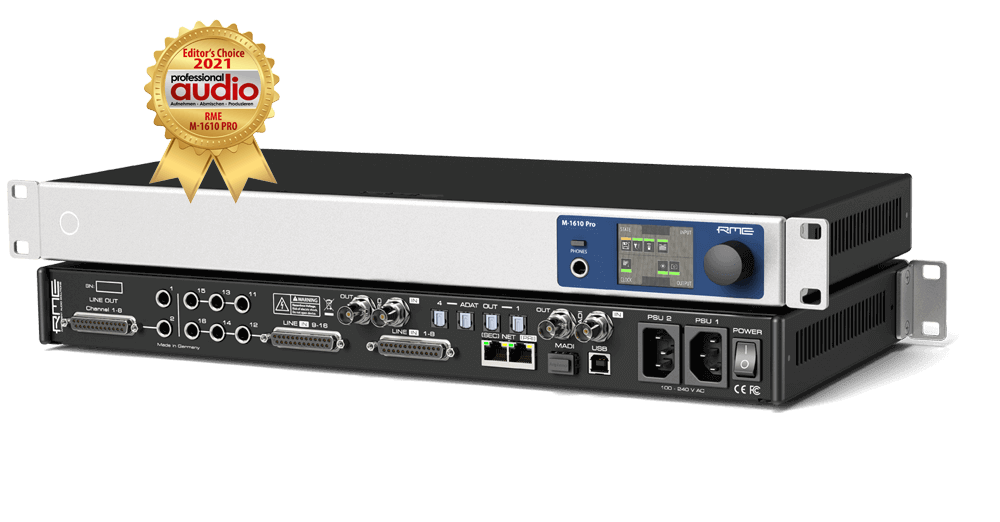

Connectivity and Features
Simplicity at first glance - Flexibility and reliability beyond
Integrating 16 analog inputs with a switchable sensitivity of up to +24 dBu per channel; 8 corresponding analog outputs; and an additional headphone output, the M-1610 Pro brings plenty of analog I/O to any studio setup. With its coaxial and (optional) optical MADI, redundant AVB, four ADAT optical outputs, and redundant DC coupled outputs, the device represents one of the most versatile and highest-performing converters on the market.
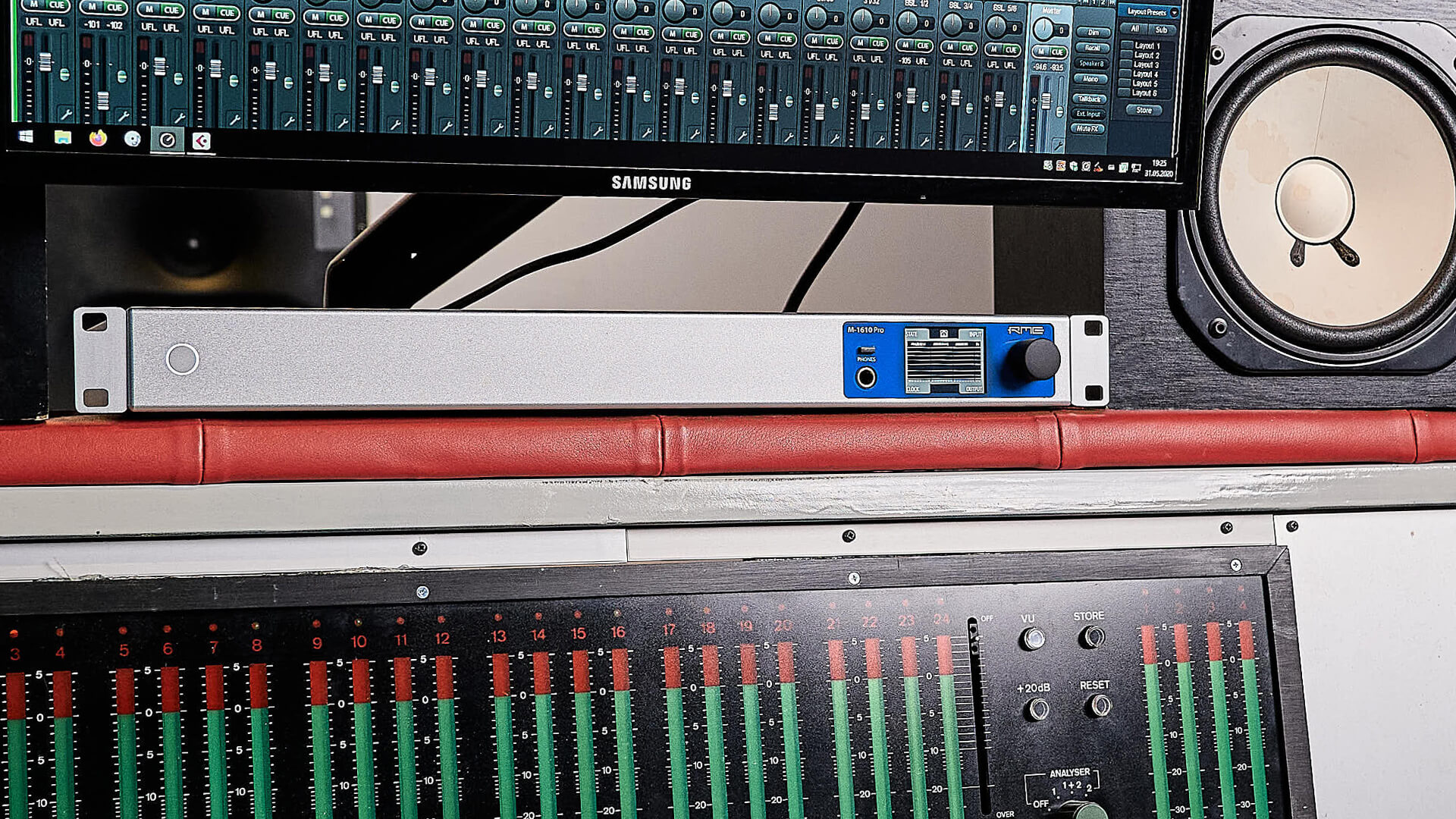
Perfect for recording engineers using a variety of analog effects and instruments.
Add Analog and AVB I/O to any existing MADI devices
At the request of recording engineers using a variety of analog effects and instruments in their sessions, RME have combined the outstanding performance of the M-32 Pro AD and DA converters into a single device, and at an unbeatable price-point.
When compared with the M-32 Pro series, which were designed primarily for fixed installations, the M-1610 Pro adds a selection of additional user-friendly features, for seamless operation in studio, live and broadcast. Input and output TRS jacks provide alternative connections for the D-Sub inputs (inputs 11-16) and D-Sub outputs (outputs 1-2), alongside redundant network ports, a headphone output for monitoring and trouble-shooting, and quick access buttons for source selection and volume.
The internal routing matrix provides visual control over all channels side by side - up to eight AVB streams (with a total of 128 channels); the coaxial and (optional) optical MADI ports (with each up to 64 channels); all analog I/O; and the ADAT outputs, for flexible routing between the 272 inputs and 298 outputs.
Lowest converter latencies and deterministic AVB networking with configurable network delay down to 0.3 ms allow the M-1610 Pro to deliver samples, even from multiple devices, at incredible speeds - time-aligned with nanosecond accuracy across an entire network. The AD and DA filters have been carefully optimized for different sampling rates, with a focus on accuracy and RME’s signature ‘transparency’ (nothing added, nothing removed). Together with SteadyClock FS, RME’s ultra-low jitter digital clock technology, the conversion to and from analog is state-of-the-art, at any level and across all digital formats. As a notable difference to similar devices, the three analog line levels per channel each offer the full dynamic range of the converters.
Plug & play - rapid user interaction
Control all device states directly from the front panel for convenient, direct access to all features. RME AVB devices can also be fully remote controlled via a web-interface on any network link (including wirelessly over Wi-Fi), allowing for the rapid creation of gain groups, phantom power switching, and routing of signals to headphones for monitoring. The integrated routing matrix allows for quick routing of any analog inputs straight to the headphone output, as well as all digital signals and AVB streams. As such, problem-solving of signals, clocking, connectivity or other issues is both simple and straight-forward!
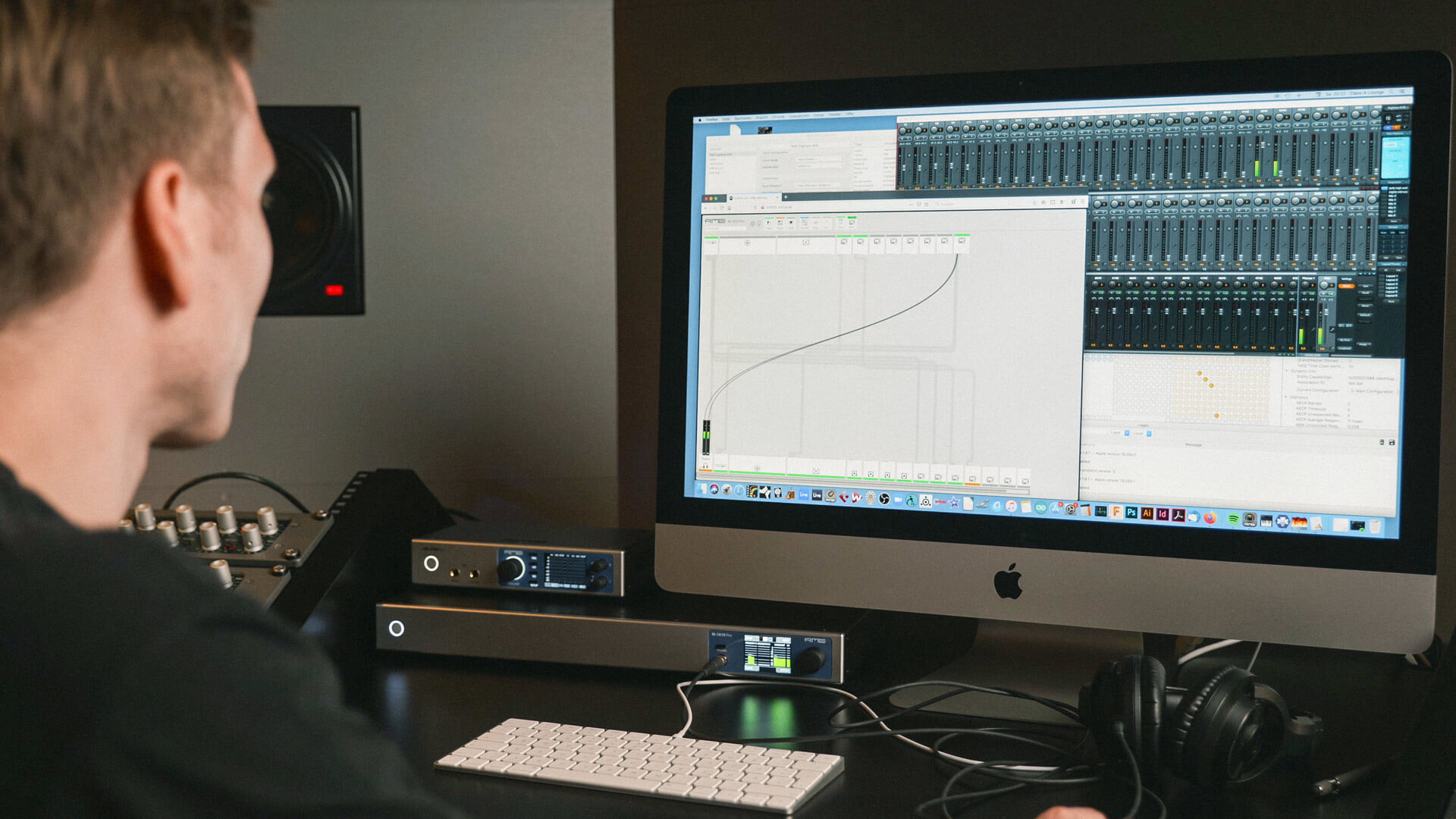
Direct access to all features via the web-interface on any network
SteadyClock FS - Reference class Digital Clocking
In digital audio, the clock frequency is an essential factor, as it creates the correlation between the audio bits and the time reference. Unfortunately, the clock frequency is not always as stable as desired. The M-1610 Pro offers full SteadyClock FS performance for lowest jitter and highest jitter immunity.
Excellent performance in all clock modes and High Quality Analog Conversion to hear your mix as it is. Digital format conversion in RME products are done without any loss or degredation,and SteadyClock FS ensures your sonic image will never experience degredation. This helps to optimize recordings and mixes because the soundstage has more depth and clarity.
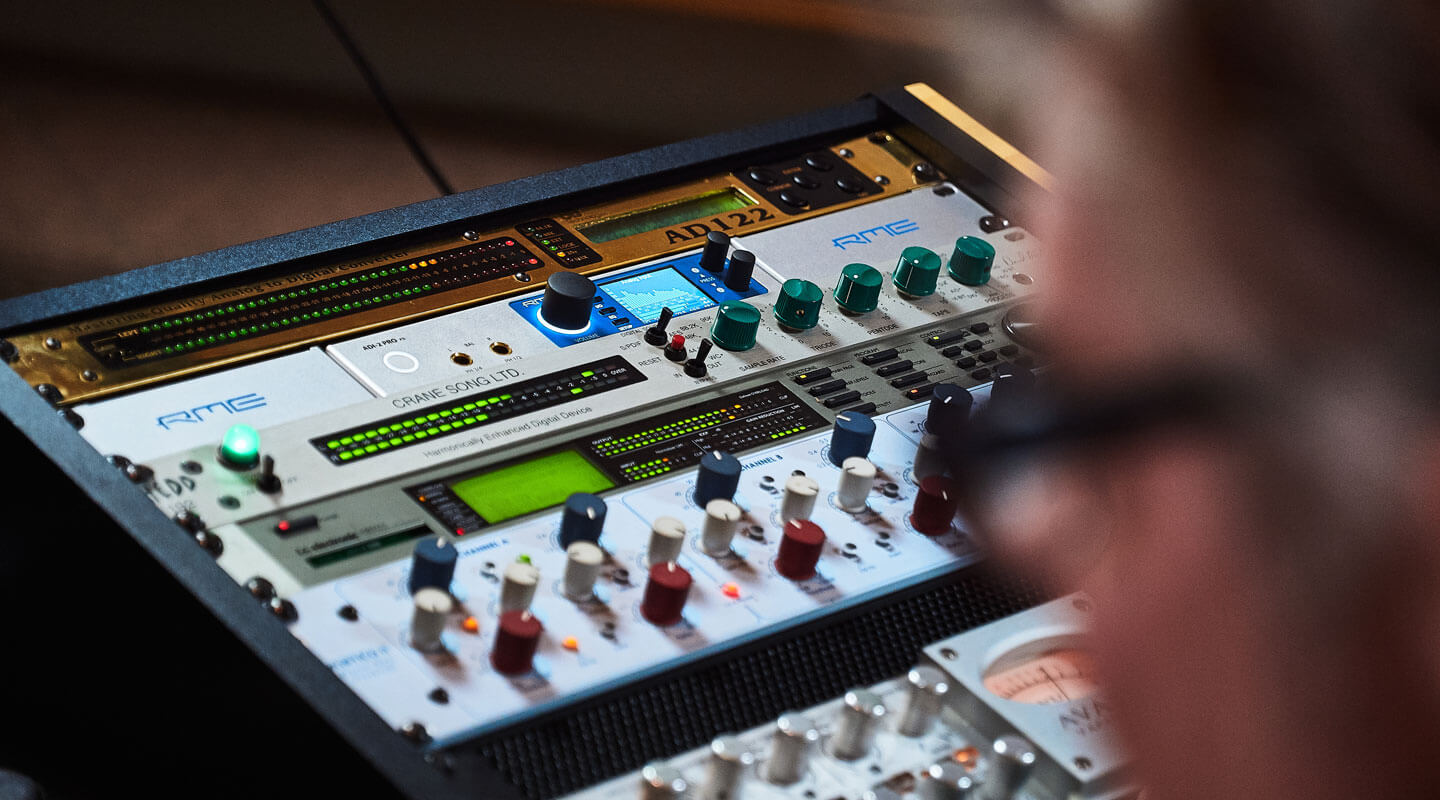
SteadyClock FS Technology from the countless award winning ADI-2 Series
About MADI - Multi Channel Digital Audio Protocol
MADI is a protocol that has evolved alongside RME to be the most widely accepted multi channel digital audio protocol on the market. RME’s MADI-based systems deliver incredible reliability, particularly in applications where failure is not an option.
Accessories
Optical MADI SFP Module (optional available)
This module extends compatible RME devices with an optical SFP transceiver. Up to 64 audio channels can then be sent to and received from other MADI devices. THE RME SFP module is available in a Multi-Mode and in a Single-Mode version, it can be inserted and removed while the RME MADI device is powered on. It is not necessary to power down the device.
Specs
M-1610 Pro
Inputs
Line In 1-16:
- Resolution: 24 bit
- Input level switchable per channel +24 dBu, +19 dBu, +13 dBu @ 0 dBFS
- Inputs AC coupled, fully symmetrical signal path (servo-balanced)
- Signal to Noise ratio (SNR) @ +24 dBu, 44.1 kHz: 117.0 dB RMS unweighted, 120.7 dBA
- Signal to Noise ratio (SNR) @ +19 dBu: 116.3 dB RMS unweighted, 119.9 dBA
- Signal to Noise ratio (SNR) @ +13 dBu: 114.7 dB RMS unweighted, 118.3 dBA
- Frequency response @ 44.1 kHz, -0.1 dB: 5 Hz – 20.5 kHz
- THD @ -1 dBFS: < -111 dB, < 0.00029% • THD+N @ -1 dBFS: < -108 dB, < 0.00039 %
- Channel separation: > 110 dB
MADI:
- Coaxial via BNC, 75 Ohm, according to AES10-1991
- Optical via optional SFP module
- 62.5/125 and 50/125 compatible
- Accepts 56 channel and 64 channel mode, plus 96k Frame
- Single Speed: up to 64 channels 24 bit 48 kHz
- Double Speed: up to 32 channels 24 bit 96 kHz
- Quad Speed: up to 16 channels 24 bit 192 kHz
Word Clock:
- 75 ohm Word Clock BNC connectivity
- Support 44.1kHz - 192kHz
- Support full or single speed operation
- SteadyClock FS extracts low jitter clock signal
- Intelligent Clock Control switches clock source seamlessly
Outputs
Line Out 1-8:
- Resolution: 24 bit • Output level switchable per channel +24 dBu, +19 dBu, +13 dBu @ 0 dBFS
- Output level at TRS 1, 2 max. +19 dBu @ 0 dBFS
- Outputs DC coupled, fully symmetrical signal path („truly balanced“)
- Output impedance: 200 Ohm balanced, 100 Ohm unbalanced
- Signal to Noise ratio (SNR) @ +13/+19/+24: 116 dB RMS unweighted, 119 dBA
- Frequency response @ 44.1 kHz, -0.1 dB: 0 Hz – 22 kHz
- THD @ -1 dBFS: < -109 dB, < 0.00035 % • THD+N @ -1 dBFS: < -107 dB, < 0.00043 %
- Channel separation: > 110 dB
Phones 1/2:
- Resolution: 24 Bit
- Noise (DR): 115 dB RMS unweighted, 118 dBA
- Frequency response @ 44.1 kHz, -0.5 dB: 9 Hz – 22 kHz
- Frequency response @ 96 kHz, -0.5 dB: 9 Hz – 45 kHz
- Frequency response @ 192 kHz, -1 dB: 8 Hz - 75 kHz
- THD+N: < -100 dB, < 0.001 %
- Channel separation: > 110 dB
- Output: 6.3 mm TRS stereo (unbalanced) or mono (balanced) jack
- Maximum output level at 0 dBFS: +13 dBu (unbalanced), +19 dBu (balanced)
ADAT:
- 4 x TOSLINK
- Quad Speed (S/MUX4): 4 x 2 channels 24 bit 192 kHz
MADI:
- Coaxial via BNC, 75 Ohm, according to AES10-1991
- Optical via optional SFP module
- 62.5/125 and 50/125 compatible
- Accepts 56 channel and 64 channel mode, plus 96k Frame
- Single Speed: up to 64 channels 24 bit 48 kHz
- Double Speed: up to 32 channels 24 bit 96 kHz
- Quad Speed: up to 16 channels 24 bit 192 kHz
Word Clock:
- 75 ohm Word Clock BNC connectivity
- Support 44.1kHz - 192kHz
- Support full or single speed operation
- SteadyClock FS extracts low jitter clock signal
- Intelligent Clock Control switches clock source seamlessly
General
- Switchable sensitivity per channel +13/+19/+24 dBu
- 2 x RJ45 1 GigE AVB, eight streams (128 Channels) with 1-8/12/16 Ch., fully redundant
- MADI input redundancy (requires optional SFP module)
- MADI Auto-Input - seamless redundancy
- Internal routing of all 272x298 channels
- MADI-AVB conversion
- 2 x monitored fully redundant internal PSUs
- 19” enclosure 1 height unit
- 2” full color display with control knob for device control
- SteadyClock FS - ultra-low jitter digital clock technology
- SyncCheck® and ICC® - detects when a clock source is not in sync and falls back to other available signals
- Remote control via HTTP, JSON, IEEE 1722.1, ATDECC, MIDI over MADI
- USB 2.0 (for remote control and firmware updates)
- DC-coupled outputs
Hardware Specifications
- Dimensions: 440 x 44 x 243 mm (17.3 x 1.7 x 9.6 inches)
- Weight: 2.8 kg (6.2 lbs)
- Package: 560 x 315 x 115 mm (22.1 x 12.4 x 4.5 inches)
- Conformity: CE, FCC, WEEE, RoHS
- Power supply: Dual 30W 100-240 AC
- Power consumption: typ. 20 W, standby 0.5W
All specifications are subject to change without notice.
Drivers
M-1610 Pro
Firmware 2.5.1. Main update. Carefully read the instructions in the readme.pdf!
